一般疑问句和否定句
小学英语四种基本句型-肯定句、否定句、一般疑问句与特殊疑问句
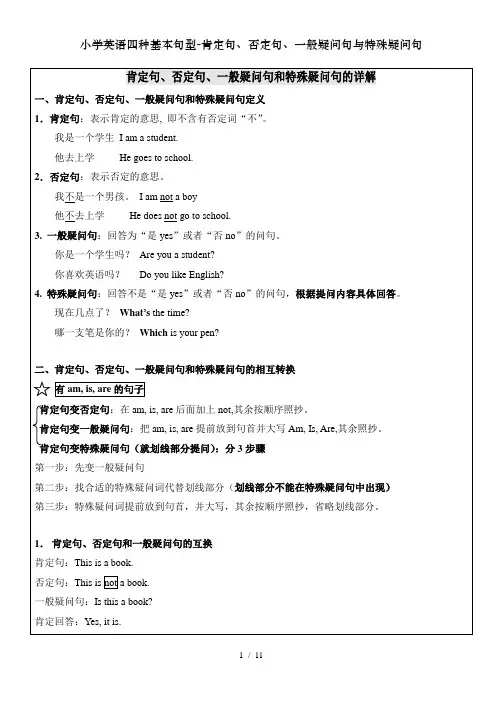
3 / 11
小学英语四种基本句型-肯定句、否定句、一般疑问句与特殊疑问句 特殊:
1.some 变为 any There are some birds in the tree.→There aren't any birds in the tree. 但是,若在表示请邀请、请求的句子中,some 可以不变。 Would you like some orange juice? 与此相关的一些不定代词如 something, somebody 等也要进行相应变化。
2.就划线部分提问(变特殊疑问句) I like English. 第一步:先变一般疑问句 Do you like English? 第二步:找合适的特殊疑问词代替划线部分 Do you like what? 第三步:特殊疑问词提前放到句首,并大写,其余按顺序照抄,省略划线部分。 What do you like?
类别 陈述句
疑问句
用法
标点
肯定 叙述一件事情或 说明说话人的看法 .
否定
一般 用于提出问题
?
特殊 用于提出问题
?
例句 This is a bag. That's my book. I can see a bag over there. I don't know. Are you a student? Do you like puppets? Can you speak English? What's your name? Where's my bag? How many trees are there?
1. 肯定句、否定句和一般疑问句的互换 肯定句:This is a book. 否定句:This is not a book. 一般疑问句:Is this a book? 肯定回答:Yes, it is.
一般疑问句,否定句,肯定、否定回答,选择疑问句(新概念)
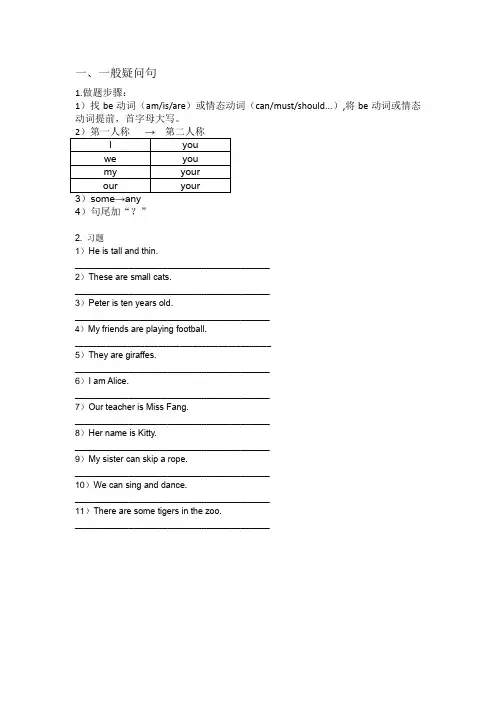
一、一般疑问句1.做题步骤:1)找be动词(am/is/are)或情态动词(can/must/should...),将be动词或情态动词提前,首字母大写。
4)句尾加“?”2. 习题1)He is tall and thin.________________________________________2)These are small cats.________________________________________3)Peter is ten years old.________________________________________4)My friends are playing football._____________________________________________5)They are giraffes.________________________________________6)I am Alice.________________________________________7)Our teacher is Miss Fang.________________________________________8)Her name is Kitty.________________________________________9)My sister can skip a rope.________________________________________10)We can sing and dance.________________________________________11)There are some tigers in the zoo.________________________________________二、一般疑问句的肯定回答/否定回答1. 主语一致1) Is he Tom?2) Are they good friends?3) Is it a panda?___________________ _____________________ ______________________ ___________________ _____________________ ______________________4) Is your sister a pupil? 5) Are Danny and Kitty friends? 6)Is the desk clean?___________________ _____________________ ______________________ ___________________ _____________________ ______________________注意①:问句用you,回答改用I或We1) Are you Jack?2) Are you Chinese?3) Are you policemen?___________________ _____________________ ______________________ ___________________ _____________________ ______________________注意②:问句用指示代词this/that或these/those,回答改用it或they(不管是人还是物) 1) Is this your T-shirt?2) Are those your coats? 3) Is that a dress?___________________ _____________________ ______________________ ___________________ _____________________ ______________________4) Is that your son? 5) Are these your toys? 6) Is this your daughter?___________________ _____________________ ______________________ ___________________ _____________________ ______________________注意 :若问句中this/that或these/those为限定词,则主语一致1) Is that man your father? 2) Are these peaches pink? 3) Is this girl your daughter? ___________________ _____________________ ______________________ ___________________ _____________________ ______________________三、否定句1.做题步骤1)在be动词后加not。
小学英语肯定句、否定句、一般疑问句和特殊疑问句的详解
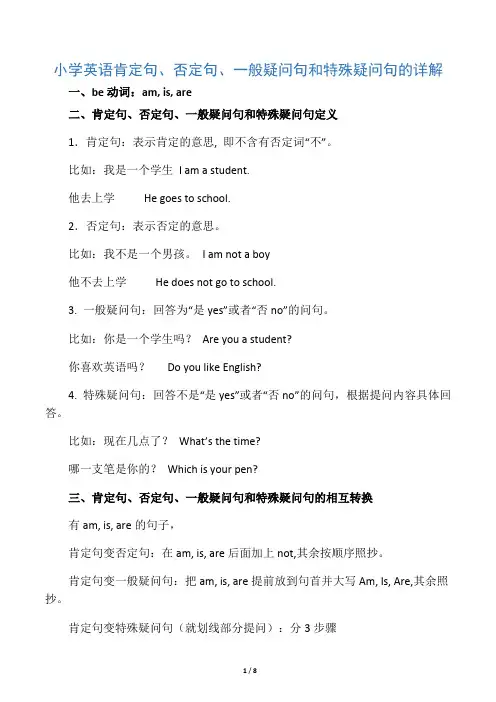
小学英语肯定句、否定句、一般疑问句和特殊疑问句的详解一、be动词:am, is, are二、肯定句、否定句、一般疑问句和特殊疑问句定义1.肯定句:表示肯定的意思, 即不含有否定词“不”。
比如:我是一个学生I am a student.他去上学He goes to school.2.否定句:表示否定的意思。
比如:我不是一个男孩。
I am not a boy他不去上学He does not go to school.3. 一般疑问句:回答为“是yes”或者“否no”的问句。
比如:你是一个学生吗?Are you a student?你喜欢英语吗?Do you like English?4. 特殊疑问句:回答不是“是yes”或者“否no”的问句,根据提问内容具体回答。
比如:现在几点了?What’s the time?哪一支笔是你的?Which is your pen?三、肯定句、否定句、一般疑问句和特殊疑问句的相互转换有am, is, are的句子,肯定句变否定句:在am, is, are后面加上not,其余按顺序照抄。
肯定句变一般疑问句:把am, is, are提前放到句首并大写Am, Is, Are,其余照抄。
肯定句变特殊疑问句(就划线部分提问):分3步骤第一步:先变一般疑问句第二步:找合适的特殊疑问词代替划线部分第三步:特殊疑问词提前放到句首,并大写,其余按顺序照抄,省略划线部分。
注意:1.一定先变一般疑问句。
但是,如果问的是主语或主语的定语时,语序不变,为"特殊疑问词(+主语)+陈述句"。
如:Li ming 's not here today.Who's not here today? 今天谁没来?2.划线部分不能在特殊疑问句中出现。
例如:肯定句、否定句和一般疑问句的互换肯定句:This is a book.否定句:This is not a book.一般疑问句:Is this a book?肯定回答:Yes, it is.否定回答:No, it isn’t.就划线部分提问(变特殊疑问句)This is a book.第一步:变一般疑问句Is this a book?第二步:找合适的特殊疑问词Is this what ?第三步:特殊疑问词提前放到句首,并大写,其余按顺序照抄,省略划线部分。
否定句及一般疑问句
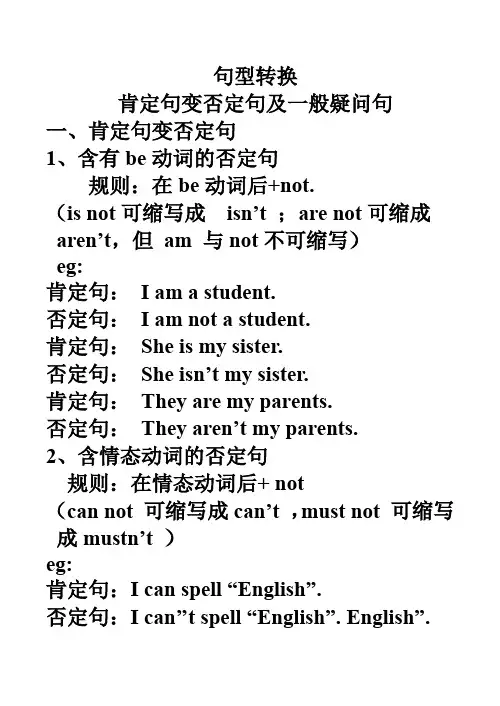
句型转换肯定句变否定句及一般疑问句一、肯定句变否定句1、含有be动词的否定句规则:在be动词后+not.(is not可缩写成isn’t ;are not可缩成aren’t,但am 与not不可缩写)eg:肯定句:I am a student.否定句:I am not a student.肯定句:She is my sister.否定句:She isn’t my sister.肯定句:They are my parents.否定句:They aren’t my parents.2、含情态动词的否定句规则:在情态动词后+ not(can not 可缩写成can’t ,must not 可缩写成mustn’t )eg:肯定句:I can spell “English”.否定句:I can’’t spell “English”.English”.肯定句:I must find it.否定句:I mustn’t find it.3、含有实义动词的句子的否定句构成(1)第三人称单数做主语。
(he、she、it或表示单个人或物的第三人称名词)规则:要在行为动词前加上助动词doesn’t,然后将动词恢复原形。
eg :肯定句:He has a soccer ball.否定句:He doesn’t have a soccer ball.(2)其它人称做主语规则:在行为动词前加don’t ,句子中的行为动词用原形。
eg:肯定句:They like bananas.否定句:They don’t like bananas.注:(1)在变否定句时,如遇some应变any Here are some books.Here aren’t any books.二、肯定句变一般疑问句1、含有be动词的句子变一般疑问句规则:把be动词提至句首,第一人称变第二人称,句末句号变问号。
(I/we变成youMy/our变成your)肯定句:I am a student.一般疑问句:Are you a student?肯定句:She is my sister.一般疑问句:Is she your sister?肯定句:They are my parents.一般疑问句:Are they your parents?2、含有情态动词的句子变一般疑问句规则:把情态动词提至句首,第一人称变第二人称,句末句号变问号。
一般疑问句和否定句以及全面的配套练习
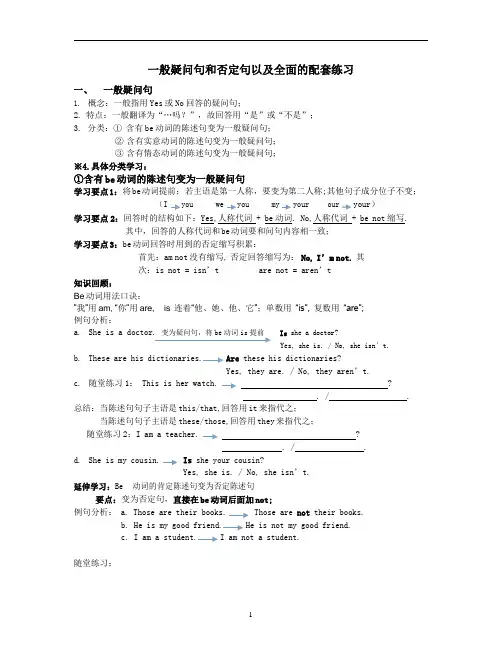
一般疑问句和否定句以及全面的配套练习一、一般疑问句1. 概念:一般指用Yes 或No 回答的疑问句;2. 特点:一般翻译为“…吗?”,故回答用“是”或“不是”;3. 分类:①含有be 动词的陈述句变为一般疑问句;②含有实意动词的陈述句变为一般疑问句;③含有情态动词的陈述句变为一般疑问句;※4.具体分类学习:①含有be 动词的陈述句变为一般疑问句学习要点1:将be 动词提前;若主语是第一人称,要变为第二人称;其他句子成分位子不变;(your your)学习要点2:回答时的结构如下:Yes,人称代词 + be 动词. No,人称代词 + be not 缩写.其中,回答的人称代词和be 动词要和问句内容相一致;学习要点3:be 动词回答时用到的否定缩写积累:首先:am not 没有缩写, 否定回答缩写为:No, I’m not.其次:is not = isn’t are not = aren’t知识回顾:Be 动词用法口诀:”我”用am, “你”用are, is 连着“他、她、他、它”;单数用“is”,复数用“are”;例句分析:a.Is she a doctor?Yes, she is. / No, she isn’t.b.Are these his dictionaries?Yes, they are. / No, they aren’t.c.随堂练习1: This is her watch. ?. /.总结:当陈述句句子主语是this/that,回答用it 来指代之;当陈述句句子主语是these/those,回答用they 来指代之;随堂练习2:?. /.d.Is she your cousin?Yes, she is. / No, she isn’t.延伸学习:Be 动词的肯定陈述句变为否定陈述句要点:变为否定句,直接在be 动词后面加not;例句分析:Those are not their books.b.He is not my good friend.c.I am not a student.随堂练习:This is my ruler.否定句:.一般疑问句:? Yes,. / No,.小试牛刀:1.She is always a good student.(改为一般疑问句,作否定回答)一般疑问句:?Yes,. / No,.2.Daniel and Tommy(be) in Class One.3.There(be) some water in the bottle.4.I(be) ill. I’m staying in bed.5.What day(be) it today? It’s Saturday.②含有实意动词的陈述句变为一般疑问句;学习要点1:找助动词do / does 构成疑问和否定;学习要点2: 一般疑问句也要找do/does,放句首构成疑问;例句分析1:I have an apple. : 我有一个苹果。
一般疑问句与否定句语法
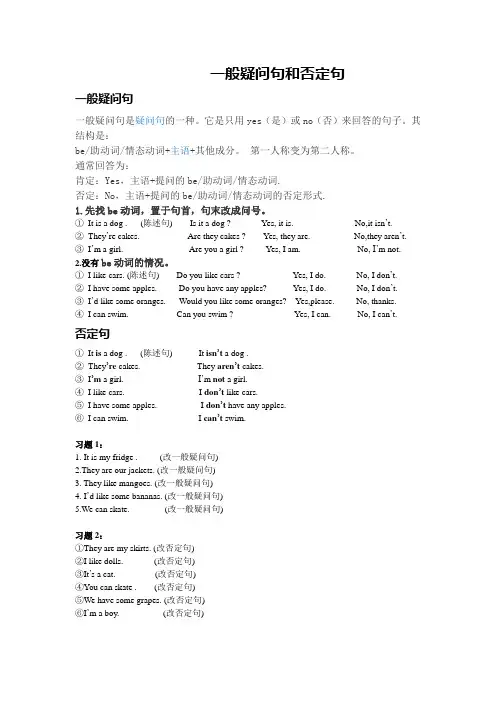
一般疑问句和否定句一般疑问句一般疑问句是疑问句的一种。
它是只用yes(是)或no(否)来回答的句子。
其结构是:be/助动词/情态动词+主语+其他成分。
第一人称变为第二人称。
通常回答为:肯定:Yes,主语+提问的be/助动词/情态动词.否定:No,主语+提问的be/助动词/情态动词的否定形式.1.先找be动词,置于句首,句末改成问号。
①It is a dog . (陈述句) Is it a dog ? Yes, it is. No,it isn’t.②They’re cakes. Are they cakes ? Yes, they are. No,they aren’t.③I’m a girl. Are you a girl ? Yes, I am. No, I’m not.2.没有be动词的情况。
①I like cars. (陈述句) Do you like cars ? Yes, I do. No, I don’t.②I have some apples. Do you have any apples? Yes, I do. No, I don’t.③I’d like some oranges. Would you like some oranges? Yes,please. No, thanks.④I can swim. Can you swim ? Yes, I can. No, I can’t.否定句①It is a dog . (陈述句) It isn’t a dog .②They’re cakes. They aren’t cakes.③I’m a girl. I’m not a girl.④I like cars. I don’t like cars.⑤I have some apples. I don’t have any apples.⑥I can swim. I can’t swim.习题1:1. It is my fridge . (改一般疑问句) _____________________________________2.They are our jackets. (改一般疑问句) _____________________________________3. They like mangoes. (改一般疑问句) _____________________________________4. I’d like some bananas. (改一般疑问句) _____________________________________5.We can skate. (改一般疑问句) _____________________________________习题2:①They are my skirts. (改否定句) _____________________________________②I like dolls. (改否定句) _____________________________________③It’s a cat. (改否定句) _____________________________________④You can skate . (改否定句) _____________________________________⑤We have some grapes. (改否定句) _____________________________________⑥I’m a boy. (改否定句) _____________________________________。
肯定句、否定句、 肯定句、否定句、一般疑问句和特殊疑问句的详解
小学英语四种基本句型-肯定句、否定句、一般疑问句与特殊疑问句
精心整理
一般疑问句:Is this a book? 肯定回答:Yes, it is. 否定回答:No, it isn’t. 2. 就划线部分提问(变特殊疑问句) This is a book. 第一步:变一般疑问句 Is this a book? 第二步:找合适的特殊疑问词 Is this what ? 第三步:特殊疑问词提前放到句首,并大写,其余按顺序照抄,省略划线部分。What is this?
肯定句、否定句、一般疑问句和特殊疑问句的详解
精心整理
一、肯定句、否定句、一般疑问句和特殊疑问句定义 1.肯定句:表示肯定的意思, 即不含有否定词“不”。
我是一个学生 I am a student. 他去上学 He goes to school. 2.否定句:表示否定的意思。 我不是一个男孩。 I am not a boy 他不去上学 He does not go to school. 3. 一般疑问句:回答为“是 yes”或者“否 no”的问句。 你是一个学生吗? Are you a student? 你喜欢英语吗? Do you like English? 4. 特殊疑问句:回答不是“是 yes”或者“否 no”的问句,根据提问内容具体回答。 现在几点了? What’s the time? 哪一支笔是你的? Which is your pen? 二、肯定句、否定句、一般疑问句和特殊疑问句的相互转换 有 am, is, are 的句子 肯定句变否定句:在 am, is, are 后面加上 not,其余按顺序照抄。 肯定句变一般疑问句:把 am, is, are 提前放到句首并大写 Am, Is, Are,其余照抄。 肯定句变特殊疑问句(就划线部分提问):分 3 步骤 第一步:先变一般疑问句 第二步:找合适的特殊疑问词代替划线部分(划线部分不能在特殊疑问句中出现) 第三步:特殊疑问词提前放到句首,并大写,其余按顺序照抄,省略划线部分。 1. 肯定句、否定句和一般疑问句的互换 肯定句:This is a book. 否定句:This is not a book.
一般现在时的构成、否定句、一般疑问句的构成
一般现在时的构成、否定句、一般疑问句的构成
一般现在时的肯定句结构是主语+谓语动词+其它,否定句:是主语+don't/doesn't+动词原形+其它。
一般疑问句是Do/Does+主语+动词原形+其它。
一般现在时的基本用法:表示经常性或习惯性的动作或存在的状态;表示客观事实或普遍真理;在时间、条件等状语从句中,用一般现在时表示将来;在某些以here,there开头的句子中,用一般现在时表示正在发生的动作。
一般现在时,是一种英语语法形式。
表示通常性、规律性、习惯性、真理性(即事实)的动作或状态,或者动作有时间规律发生的事件的一种时间状态。
在英语语法中,“时”指动作发生的时间,“态”指动作的样子和状态。
一般现在时它有两层含义,一层叫做现在,这是指的是时间,还有一个叫做一般,指的是体,至于现在我们很好理解,就是我们当下所说的一个事情,叫做现在。
所谓一般体就是它表示一种很一般的情况,它可以有的时候表达正在进行,不过不强调正在进行。
疑问句和否定句的构成及用法
疑问句和否定句的构成及用法疑问句和否定句是在英语中使用较为频繁的句型,对于初学者来说,掌握它们的构成和用法非常重要。
本文将详细介绍疑问句和否定句的构成以及它们在不同情境下的用法。
一、疑问句的构成及用法在英语中,疑问句是用来询问事实、情况或观点的句子。
疑问句的基本结构是将动词调到主语之前,以下列举几种不同的疑问句结构和用法。
1. 一般疑问句一般疑问句用于对陈述句提问,其基本结构是将助动词或情态动词放在主语之前,并加问号。
例如:- You are a student.(你是一个学生。
)Are you a student?(你是一个学生吗?)2. 特殊疑问句特殊疑问句用于询问特定的信息,其基本结构是将疑问词放在句子的前面,并加问号。
疑问词包括who(谁)、what(什么)、when(何时)、where(哪里)、why(为什么)等。
例如:- Mary is reading a book.(玛丽正在读一本书。
)What is Mary doing?(玛丽在做什么?)3. 带有或不带有助动词的特殊疑问句在特殊疑问句中,有时候也可以不使用助动词,而是用一般疑问句的结构。
例如:- They have finished their homework.(他们完成了作业。
)Have they finished their homework?(他们完成了作业吗?)Finished their homework?(他们完成了作业吗?)4. 双重疑问句双重疑问句是由两个疑问词组成的疑问句,用于询问两个问题。
例如:- Who gave you the book?(谁给了你这本书?)When and where did you receive it?(你是什么时候和哪里拿到的?)二、否定句的构成及用法否定句是对肯定的陈述句加以否定的句子。
否定句的构成主要是通过在动词前加上否定词。
以下是几种常见的否定句结构和用法。
1. 否定词not的使用在一般肯定句中,我们可以通过在动词前加上not来构成否定句。
- 1、下载文档前请自行甄别文档内容的完整性,平台不提供额外的编辑、内容补充、找答案等附加服务。
- 2、"仅部分预览"的文档,不可在线预览部分如存在完整性等问题,可反馈申请退款(可完整预览的文档不适用该条件!)。
- 3、如文档侵犯您的权益,请联系客服反馈,我们会尽快为您处理(人工客服工作时间:9:00-18:30)。
一般现在时练习题一用所给词的正确形式填空。
1. We often___________(play) in the playgound.2. He _________(get) up at six o’clock.3. __________you _________(brush) your teeth every morning.4. What (do) he usually (do)after scho ol?He usuall (do) (he) homework.5. Danny (study) English,Chinese,Maths,Science and Art an school.6. Mike sometimes __________(go) to the park with his sister7. At eight at night, she __________(watch) TV with his parents.8. ________ Mike________(read) English every day?9. How many lessons_________your classmate________(have) on Mond ay?10. What time_________his mother_________(do) the housework?改句子1. Do you often play football after school? (肯定回答)2. I have many books. (改为否定句)3. Gao Shan’s sister likes playing table tennis.(改为否定句)(改为一般疑问句)4. She lives in a small town near New York.(改为否定句(改为一般疑问句)( 划线提问)5. I watch TV every day.(改为否定句)(改为一般疑问句)( 划线提问)6. Mingming usually waters the flowers every day(用every day换成now )(用every day换成last week )7. Su Yang usually washes some clothes on Saturday.否定句:一般疑问句:划线提问:8Tom does his homework at hom否定句:一般疑问句:划线提问:一般现在时练习题二1. 他每天六点钟起床。
He ______ _____ _______ six every morning.2. 小明经常去远足。
Xiao Ming _________ ________ hiking.3. 她总是在星期天看望爷爷奶奶。
She _______ _______ her grandparent s on Sundays.4. Sandy周末上学吗?________ Sandy _______ _______school on weeken ds?5. 他什么时候去上班?When ________ he go to ________?6. 李云喜欢秋天,不喜欢冬天Li Yun _______ autumn, but he _________ like winter.7. 今天的天气怎么样?What’s the _________ like _________?8. 她有电脑吗?___________ she __________ a computer?9. Sue 有一本有趣的故事书。
Sue ______ _______ an _________ _______ _ book.10. 他们是德国人,不会说法语。
They are _______ so they _______ _____ _______.Read the story and answer the questions.A clever monkey An old tiger lives in the forest. He does not want to look for food now. He often tells other animals to bring him some thing to eat. He sees a monkey and says,” I’m hungry, monkey. Go to the village and bring me a fat pig." "Oh, Tiger," says the monkey. "I can't do that now. There is another tiger over there. He also wants a fat pig. He will not let me get anything for you to eat. I am afrai d of him." "What?" cries the tiger. "Show me that tiger. I will talk to him." "Come with me," says the monkey. The monkey and th e tiger get to a bridge over the river. "Now look down at the water," says the monkey. "Do you see the hand, the white teeth and the la rge green eyes of a tiger?" "Yes, I do," cries the old tiger," I will eat him up!" With these words, the tiger jumped into the r iver.1. What does the old tiger often do? ________________________________ __________2. What does the tiger see? _________________________________________ _________3. Is there another tiger in the forest? ____________________________ _________4. What does the old tiger do when he sees the tiger in the river? __ _________________________________________________________________5. What do you think of the monkey?按要求改写句子1.This is my pencil.(变一般疑问句)2. These red socks are Kate’s . (变一般疑问句)3. I want to buy a big green bag . (变一般疑问句)4. Mary does not have any books . (变肯定句)5. I often get up at seven o’clock . (用he改写句子)6. He often has rice for dinner. (变为一般疑问句)7. My sister wants to see the comedy. (变为一般疑问句)8. I think this story is boring. (变复数句)9. My mother usually has lunch at 12:12 . (对画线部分提问)10. Li Xing goes home late on Friday evening. (变为一般疑问句)11. There is some orange in the glass. (变否定句)12. She often has a drink after supper. (变为一般疑问句)13. My teachers are in the office. (对画线部分提问)用所给动词的适当形式填空。
1. My classmate ______ (know) the man on the bike.2. His sister usually ______ (go) to school at 7:00 am.3. Lin Tao ______ (like) his new sweater.4. Let me ______ (have)a look.5. Let’s ______ (play) tennis!6. ______ he ______ (like) English?7. I want ______ (go) to a movie.8. He ______ (not know) the teacher’s name.9. Nice ______ (meet) you!10. Can I _____ (ask) the policeman? Yes, y ou ______.11. ______ (sit) down and ______ (have) a cup of tea.12. ______ (not look) at your textbook! ______ (listen) to me.13. ______ you ______ (can see) the bananas on the table?14. It’s time ______ (play) games.15. What time ______ Mary usually ______ (play) basketball ?16. This boy likes ______ (play) chess with his father on weekends .17. Where ______ his parents ______ (work) now, do you know?18. Who ______ (teach) you English in your school?19. Helen, ______ (not be) late for class again.20. Little Tom can ______ (ride) a horse.。
